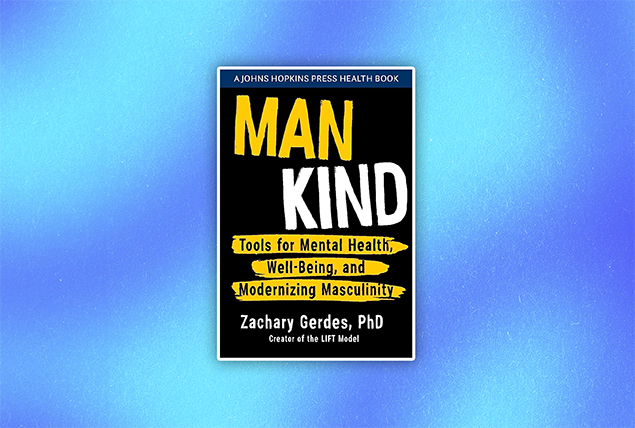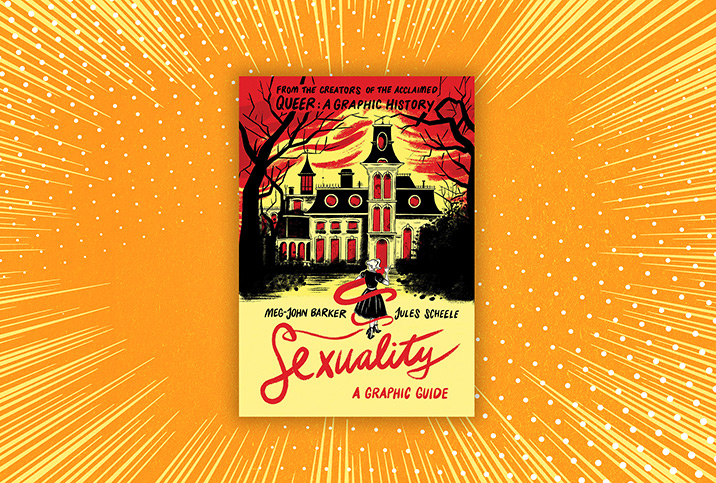Between The Pages: 'Man Kind' Helps Men Become Men

A counseling psychologist in Washington state, Zachary Gerdes, Ph.D. offers a framework for enhancing men's health in his new book "Man Kind: Tools for Mental Health, Well-Being, and Modernizing Masculinity."
Gerdes developed the "LIFT" model, a road map to assist men in fostering collaboration, understanding when and how to employ resources, and developing mental resilience and flexibility. He discourages adhering to a traditional perspective of masculinity, centered on stoicism, patriarchy and self-reliance.
In this exclusive Giddy interview, Gerdes discusses why his book is so timely, how men can communicate their sexual desires, and more.
Editor's Note: This interview has been edited for length and clarity.
Tell us about your background in psychology and interest in men's health and how it led you to write this book.
I used to be a captain in the United States Air Force (USAF) and was a clinical psychologist at a couple of different duty stations. I did a lot of our trauma work and what we call "disaster mental health."
I had originally gone into an active-duty role because of my interest in men's health and masculinity. Obviously, the military tends to be a predominantly male field.
Now, I work with first responders and police psychologists for the Washington State Patrol. And there's a similar overlap with some of the masculine norms that we look at in the research and the literature. Obviously, there's some overlap with the cultures in the military and first responder communities.
My first experiences were in a handful of arenas. I was at the VA [United States Department of Veteran Affairs] in a clinical role and a research role. And I've also dabbled in private practice and big healthcare systems, too.
The book's research was centered on my background in men's health and masculinity. Men's health and masculinity work is definitely close to my heart, both clinically and in the research. As I dived into the masculinities literature, I began to realize there wasn't a great science-backed handbook or guide for men.
A lot of textbooks have been written. And a lot of trade books are written by lay people like someone from the clergy or a journalist. I thought it would be a nice bridge to say, "Let's build on some of the science in hopefully a readable way, so that we can really bridge the gap between the trade book atmosphere around men's health and the scientific literature in men's health and psychology."
This seems like a timely book. You have some people saying masculinity is under attack, and on the other side, people are saying gender should be abolished. Why is your book an important contribution to the masculinity conversation?
The conversation seems to be really at the poles. I think there are millions of us somewhere in the middle. There's a demand for people to have good resources for how to be a better man, and not needing to abolish their gender identity. It's OK to take pride in who you are as a man and what you view around masculinity as long as it doesn't hurt other people.
That's what the book is trying to send a message about. We can be healthier as men, we can promote quality and relationships, and we can promote freedom for others. We can dispel this outdated, patriarchal, mythopoetic vision of masculinity while still retaining the good stuff of what it means to be a man.
Then how do we evolve it forward to say, how do we be better…knowing what we know from the health research?
That's really what this book is about. A middle path forward that says, "You don't have to abandon who you are. But we also shouldn't double down on stereotypes that might not be helpful in some contexts."
There's an opportunity here for growth. There's a lot of science we know for how to be better in things like relationships and in our everyday lives.
It's just taking, philosophically, what we call a functional contextual list approach or a pragmatic approach and saying, "Hey, there's probably a time and place to be a certain kind of way or act a certain kind of way." Take each situation in context and adapt accordingly. Sometimes there's a time to be emotionally vulnerable. Sometimes there's a time to kind of lock it up. But it's all about saying, you can be a man in both situations.
You write that one way you see sex lives go wrong is the man pressures his partner into more sex or types of sexual activity they're not comfortable with. What is a healthy and effective way for a guy to express his sexual desires to his partner?
Intimacy is really holistic, and that should be considered masculine also. Prioritizing sex or orgasm isn't the only way to have intimacy. First, we need to broaden our conception of what healthy intimacy is to us as men. Second, we know communication is one of the best predictors of relationship satisfaction and well-being generally.
Communicating preferences is different than putting a partner in an uncomfortable situation where they feel weird about saying no. That's part of the broader conversation on consent. We have to really pride ourselves in getting not just acquiescence but consent from a partner being just as excited as we are. As excited to help one partner pursue new avenues that can mutually help their sex life.
It shouldn't be about one person meeting another person's needs in a relationship. It should be about giving and taking mutually and having equity, and how both partners can know their partner in terms of their preferences.
It's a two-way street when it comes to equity in relationships. If you're going to try something outside of whatever it is that you've historically done, talk about it first, before you get into something that's new and different. Talk about it before you start the foreplay process.
Secondly, when it comes to, let's say, a couple who are starting to explore different sexual aspects of a relationship, we have to be super clear as men that we have to need total clarity that the person that we're being intimate with is into it. Somebody being into it is different than somebody not stating a preference. There has to be approval confirmation on both sides.
Sometimes there's a situation where somebody won't explicitly say no, but they're kind of thinking it in their head. We have to take pride as men to check in with the other partner to say, "Are you sure you're into this?" And being totally open to whatever the response is.
We're not entitled to sex. No one is. It's not something we barter or transact. And that entitlement can get in our way. It's super-important to know that [any relationship] is two equal partners on an equal footing and it's a two-way street around intimacy.
Disclaimer: The opinions expressed here by Zachary Gerdes, Ph.D., are his alone and do not necessarily reflect the official policy or position of the United States Air Force, Department of Defense, Federal Government of the United States, State Government of Washington, or the Washington State Patrol.


















